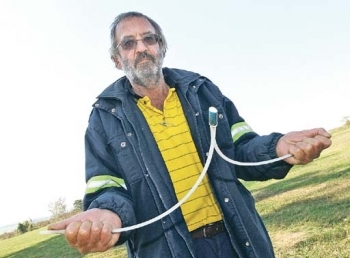
They don’t call it a “divining rod” for nothing. This little stick set up gives powers beyond unaided human abilities–it helps tap into the “Divine powers.” It’s woo-woo. Maybe even hoodoo. This guy used to find water underground with a diving rod in exchange for a bottle of whiskey. After he worked up to 15 bottles per day, he switched to cash.
But, people love the idea of knowing something beyond their typical capacity. With horoscopes, palm reading, psychics, crystal balls, or seances, the idea is the same: Get valuable information through supernatural means in order to get an edge, or special comfort from that knowledge.
But Christians don’t really do that, right?
BUZZ. wrong. Thanks for playing :)
(I got a little “Robin Williams” on you there for a second.)
Yes. Christians often try to maintain control over their world through the supernatural/divine, to use it to their benefit. It just might be a bit more subtle. Or, it’s just labeled differently so it has a Biblical righteousness to it. Nevertheless it’s a trap the produces shallow spiritual growth.
This new Series I’ll do, on “common Christian hoodoo,” I will unveil ways which we, as spiritual people, get all “witch doctory” on God, for our benefit. Ways we try to toy with him for our own advantage and comfort, most often without really realizing it. Our perspective has sort of gotten a mite warped in how we relate to the Divine. God might put up with it, (He’s gracious-that how he rolls.) but it surely stunts our spiritual growth, and intimacy with God, our loving Creator.
It’s not too much different than a average, healthy, 30 year old who expects to be fed by mommy from a bottle, and wiped cleaned after using the potty. One can get by that way, but it’s really not so good, ya know? It’s not the best for the person. It’s not very mature, but one could get along that way.
Still, a good parent will often challenge a growing child to become stronger and more developed, which is not just better for that person, by for the community as a whole. God does the same thing, which could be part of the reason you are struggling with some tough things right now, and reading this as well. It’s challenge time for you, in some way.
If you think about it, you may have used prayer as a kind of divining rod tool a few times. Right? Have you ever prayed something like, “God, if you want me to do this, please, give me a sign.” We hope that a kind of “divining rod prayer” will show the way to or through something that seems outside our grasp, or beyond our vision. We get witchy with the supernatural to find out stuff we need to know. Be honest, you’ve done this! I sure have!
My questions/reflections…Is this just an immature attempt to get control? Is it a maneuver to manipulate the supernatural for our purposes? If not, what is it? When should it be done, if at all? Is there a better way?
More on this, in a specific way, later. But–Tell us your ideas!
Click here for The hoodoo / voodoo self-test. “How much Hoodoo do you do?”
Funny, so darn hip, and even mildly enlightening.
Leave your feedback. Do you, or anyone you know, get hocus-pocus with God?

